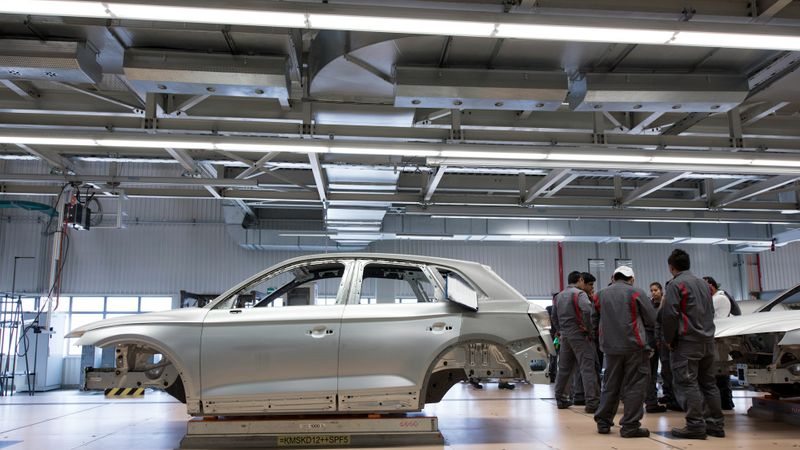4 Ways Rapid Prototyping Accelerates Innovation in New Energy Vehicles
From the days when ICE cars saw minor updates every three years and major redesigns every five, we’ve shifted to an era where new EV models are released annually. The rapid evolution of electric vehicles is not only energizing the market, but also intensifying competition among manufacturers.

Photo by carlos aranda on Unsplash
From the days when ICE cars saw minor updates every three years and major redesigns every five, we’ve shifted to an era where new EV models are released annually. The rapid evolution of electric vehicles is not only energizing the market, but also intensifying competition among manufacturers.
EV manufacturers need to innovate more quickly than ever to stay competitive in a market that’s expected to grow rapidly. According to Grand View Research, the global electric powertrain market was valued at $83.30 billion in 2022 and is projected to grow at a compound annual growth rate (CAGR) of 15.3% through 2030.
Manufacturing Challenges in EV Motors, Batteries, and ECUs
At the heart of this rapid shift towards electric vehicles are three critical components: EV motors, batteries, and ECUs (Electronic Control Units). These elements form the backbone of every electric vehicle, powering its movement, optimizing energy efficiency, and managing complex operations. However, as the industry grows, so do the manufacturing challenges associated with these components.
EV Motors
The design of EV motors is crucial for efficiency. Manufacturers now use thinner stamped lamination sheets (between 0.15 mm and 0.3 mm) to reduce power consumption, but producing these sheets requires extreme precision, especially when handling intricate profiles and sharp corners. Additionally, the need for lightweight materials and complex cooling systems to prevent overheating further complicates motor manufacturing. For mold makers, these factors demand high accuracy to ensure performance and keep assembly costs low.
Batteries
Batteries serve as the heart of every EV, where power storage and management are critical to vehicle performance. Several production challenges arise:
- Efficient cooling systems are needed to prevent overheating during use.
- Precise use of materials such as silicon carbide and ceramics is required for durability and heat resistance.
- Perfectly sealed shields are essential to prevent leaks and sediments, which can compromise battery efficiency and safety.
- The growing demand for smaller, lighter battery designs calls for highly accurate mold tooling and efficient production methods.
ECUs (Electronic Control Units)
These units manage critical functions such as power distribution and motor control. Producing intricate micro molds for ECUs is a significant challenge, as even small deviations can affect performance and safety. Manufacturers must ensure precision and consistency, particularly in customized production.
How Rapid Prototyping Solves These Manufacturing Challenges?
Automotive Manufacturers need solutions that increase efficiency, reduce costs, and allow for greater customization. Rapid prototyping has become a key tool to address these challenges.
- Digital Manufacturing and Quality Control
Rapid prototyping uses advanced digital manufacturing techniques to ensure precise production of complex components like thinner stamped lamination sheets for EV motors. By leveraging 3D printing and CNC machining, manufacturers can quickly create and test motor designs, optimizing for both efficiency and durability. This process allows for rapid iteration of complex cooling systems to prevent overheating, ensuring that all parts meet the required specifications.
- Low-Volume, High-Customization Production
Battery production often requires customized solutions for challenges like efficient cooling and ensuring perfect seals. Rapid prototyping enables manufacturers to produce small batches of custom battery modules or cooling components at a lower cost. This flexibility allows for frequent design adjustments to meet the evolving demands for smaller, lighter batteries without costly retooling or manual interventions. It also ensures that material precision and sealing are tested and verified before large-scale production.
- Supplier Integration for Streamlined Production
For EV manufacturers, working with a single supplier from prototype to full-scale production simplifies the process. Rapid prototyping allows seamless supplier integration, reducing the time and costs associated with switching suppliers. This ensures consistent quality and faster production, especially when developing critical components like motor housings and battery enclosures.
- Accelerated Time-to-Market
In ECU development, where micro molds with extreme precision are essential, rapid prototyping accelerates the time-to-market by allowing manufacturers to quickly design, test, and refine intricate components like ECU casings and micro connectors. This ability to rapidly iterate and test designs ensures that production can proceed without long delays, meeting the stringent requirements for safety and performance in the fast-evolving EV market.
RPWORLD’s On-demand Manufacturing Solutions for EV Component Innovation
RPWORLD offers a wide range of manufacturing services, including CNC machining, injection molding, vacuum casting, and a variety of finishing options, providing automotive customers the flexibility to select the best methods for developing and producing components. Whether for traditional ICE vehicles or EVs, our services enable rapid prototyping with the highest precision and shortest lead times. Our expertise in electric vehicle component development is extensive, offering specialized solutions for motors, batteries, and ECUs, such as:
- Precision motor housings and lamination components for optimal efficiency
- High-quality battery pack enclosures and cooling system components
- Custom-designed battery module connectors and management system housings
- Detailed ECU casings and intricate micro connectors for zonal control units
- Thermal management parts for both battery and ECU systems to ensure efficient heat dissipation
As the automotive industry continues to shift toward electric vehicles, RPWORLD is proud to serve as a trusted partner, providing rapid prototyping solutions that help drive innovation and accelerate the transition to an all-electric future. Let’s work together to bring your EV projects to life.